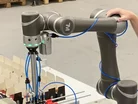Made Smarter: Robotics and Automation Creates Jobs

Since 2019, North West Adoption Programme (a collaboration between the UK government and industry to support the increased use of digital technologies) has supported 41 businesses with 45 technology projects with a focus on robotics and automation machinery.
The £2mn investment (combining £883,000 in grant funding and £1.1mn of private finance) is expected to create 183 new jobs, upskill 234 existing workers, and grow the region’s GVA by £137.4mn over the next three years.
The Benefits of Robotics and Automation
“These figures are further evidence that robots, cobots, and process control automation technologies are creating more jobs than they displace, as well as a host of other benefits,” said Alain Dilworth, North West Adoption Programme Manager at Made Smarter.
“Manufacturers who have adopted these digital technologies are experiencing increased productivity and efficiency, more consistent and improved part production and quality, lower operating costs, reduced lead times, the ability to be more competitive, and improved worker safety.
“The Made Smarter North West Adoption Programme has proven the value that digital technology can bring to the manufacturing sector. By providing businesses with specialist, impartial technology advice, grant funding for projects, digital transformation workshops, a leadership programme, digital technology internships, and skills development, Made Smarter is helping them select the right approach and the appropriate level of investment and tools for their business. Ultimately, at the heart of any change are the people, who are fundamental to understanding the need for change, driving that change and adopting that change.”
Harnessing Robotics in Agricultural Machine Manufacturing
Storth, an Agricultural machine manufacturer based in Cumbria, has been using robotics to navigate staff shortage during the pandemic as well as overcome the challenge of skilled welders being tied up with repetitive tasks.
Harnessing a robotic welding system, the company can produce parts twice as fast as a human and has moved welding staff to higher value, more rewarding, and more technically challenging roles.
“Our investment in the robot welder enabled us to manufacture quicker and cost-effectively, and solved the problem of manpower not just in terms of sourcing quality welders to satisfy demand but to maintain production during the pandemic when welders were self-isolating. Meanwhile, the technology has made us more competitive to be able to react quickly to orders and changed the way we can approach export markets,” said Julian Lopez, Export Manager at Storth.
Cobots in Ammunition Manufacturing
Based in Preston, ammunition manufacturer, Empire Cartridges has invested in six-axis cobots and process control technology. In doing so the company has increased its manufacturing output by at least 50%.
“By adopting Industry 4.0 automation we have been able to increase quality control, reduce manual handling and upskill our workforce from simple box fillers to cobot programmers,” said Andrew Bond, CEO, Empire Cartridges.
For more information on Made Smarter, click here.
- Why has CCEP Spent Millions on ASRS for its Wakefield site?AI & Automation
- Schneider Electric to Showcase 2025 Offerings at SPSDigital Factory
- How is ABB Revolutionising Automotive Sustainability?Sustainability & ESG
- Augury: AI-Powered Machine Health and Solving the Skills GapAI & Automation

